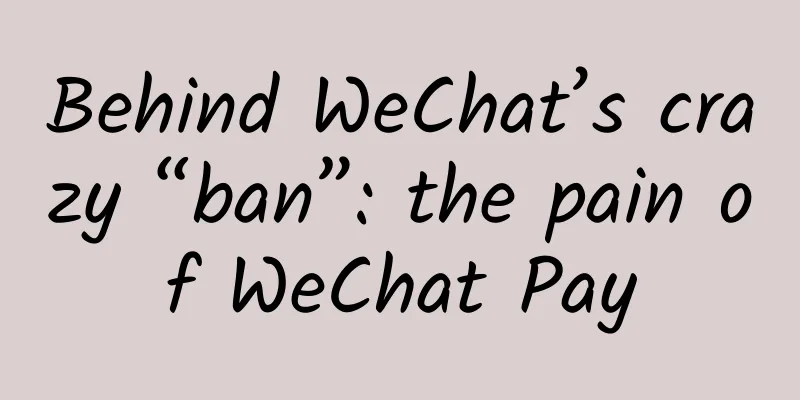Behind WeChat’s crazy “ban”: the pain of WeChat Pay

|
WeChat has been really willful recently, banning Alipay Wallet, Kuaidi, Xiami Music, Tiantian Dongting, NetEase Cloud Music...Except for NetEase Cloud Music and Tiantian Dongting, all the others are Alibaba-affiliated or related companies. Tencent, which claimed at the beginning of the year that it would connect everything, is in such a hurry to cut off some connections? It seems that someone has really stepped on its pain points. For example, if WeChat payment is not connected, all connections are false propositions. Connected or closed? Several acquisitions in early 2014 showed that Tencent's goal was to add, to establish enough connections, such as connecting with JD.com and Dianping, to connect people with people, and then with people with goods, people and services. A year later, Tencent has begun to subtract, blocking competitors to compete for space for its own products. An interesting theory is, "If a platform has a 90% market share, it can attract the 10% from outside by closing it off. If it is closed at 50%, external growth will be greater than internal growth, and the platform will wither." Taobao banned Baidu's product searches and blocked WeChat links, using closure to build its own fence. Is it time for WeChat to close down? I don’t think so. WeChat’s market share in the social field is indeed over 90%, but WeChat obviously wants to carry more, such as payment, e-commerce, O2O, etc. WeChat has never had the upper hand in the most critical payment battle, and if the payment fortress is not in its hands, the value of the connection itself will be greatly reduced. During the 2014 Spring Festival, WeChat red envelopes were all the rage, but the share of mobile payments was decreasing rather than increasing. Seeing that Alipay and Kuaidi were about to get involved in WeChat payment-related fields, WeChat naturally took drastic measures. Therefore, the large-scale blocking was not due to lack of trust, but because it was really anxious. (Spoiler: The focus of this article is in the third part) Clearing obstacles for WeChat Pay In early December 2014, WeChat banned the red envelope sharing links of Kuaidi taxi-hailing app, saying it was "suspected of inducing sharing." Meanwhile, Kuaidi's competitor Didi continued to be active in the WeChat system, continuing to send red envelopes, even with corporate sponsorship, directly monetizing traffic and becoming a low-cost channel for companies to place advertisements. On February 2, the red envelope product developed by Alipay Wallet was connected to WeChat. But just 8 hours later, WeChat banned the red envelope distribution link of Alipay Wallet. After being banned, red envelopes in Alipay Wallet cannot be sent to WeChat, and the Alipay red envelope link that was "left" in WeChat before, when opened, shows "Taobao blocked the browsing request from WeChat". WeChat issued a statement saying, "We do not allow anyone to conduct malicious marketing in the name of red envelopes and destroy the user experience. In the near future, we will gradually crack down on those who sell dog meat under the guise of selling dog meat. When Alibaba is connected to WeChat Pay, we will discuss this issue again." On February 4, WeChat continued to block Xiami Music, NetEase Cloud Music, and Tiantian Dongting, which are in direct competition with QQ Music. Of course, the reason was also "suspected of malicious marketing." It is worth mentioning that after WeChat banned links from Alipay, apart from a few individuals who attempted to send red envelopes, most of those who were affected were actually experiencing whether the Alipay wallet itself was smooth. More and bigger victims were micro-businesses that relied on WeChat public accounts for their survival. A merchant who sells bags on WeChat saw the page "Taobao blocks WeChat browsing requests" and thought that Alipay had blocked merchants in the WeChat system, so he went directly to Alipay customer service to argue. In the end, it was WeChat that took action first. The merchant said that most users' shopping payment habits are on Alipay, and this ban will definitely affect sales. According to the survey data of Yibang Power Network, Alipay is still the main payment method for WeChat merchants. 60% of users use Alipay to consume in WeChat, and WeChat payment accounts for only 34%. Cheng Xiaoyong, the founder of WeChat Hai, a third-party service provider of WeChat, also confirmed that 60% of the orders of its cooperating merchants are currently paid through Alipay, and WeChat payment accounts for only about 20%. It seems that the reason for WeChat's loss of composure is still due to payment. By blocking competitors' products and scenarios, it is on the one hand to vent its anger, and on the other hand to try to gain time and space for the development of its own products. "Blocking" is a detour WeChat red envelopes are very popular and are a good marketing and new customer acquisition tool. However, these accounts that have opened payment services are difficult to convert into paying users because they do not have strong enough application scenarios. According to iResearch data, in the second quarter of this year after the Spring Festival red envelope war, the mobile payment share of Alipay Wallet increased from 76.2% to 79.9%, while the market share of Tenpay decreased from 12.9% to 8.9%. In the third quarter, Alipay accounted for 82.6% and Tenpay accounted for 10%, which is still not much improvement. But the fortress that WeChat is trying to connect everything is payment. If there is no payment connection, it has no value. Didi Taxi is the most popular application scenario in the WeChat system. According to insiders, Didi Taxi accounts for nearly 90% of WeChat payment scenarios. WeChat naturally spares no effort in supporting Didi. 80% of Didi’s traffic comes from WeChat. This highly integrated situation is the real reason why WeChat banned Kuaidi, not the so-called "suspected malicious inducement". Similarly, although WeChat has been working hard to expand the payment scenarios that can be realized by JD.com and Dianping, the attempt of JD.com shopping within the WeChat system has almost failed, and its shopping experience is ruined. Dianping can give priority to WeChat payment in its own products, but it is impossible to shut down Alipay to support WeChat payment. As for offline, although WeChat Pay has been exploring offline scenarios, it has achieved little success. Weishihuo, which was highly anticipated before, also failed to develop, and was thrown to Dianping to get rid of the burden. According to an insider of WeChat Pay, Weishihuo also lost the payment scenarios of nearly 50,000 high-quality merchants. Now that WeChat Pay wants to promote payment, it can only repeat what the Weishihuo team did at that time. Zhang Xiaolong, the head of WeChat, is a geek. When Weishihuo recruited so many agents and the offline team quickly grew to hundreds of people, far exceeding the product technology team, Zhang Xiaolong was eager to get rid of the offline "burden". However, he later found that it was difficult to implement offline payment scenarios with the help of third parties, and when he started again, he had already lost the opportunity. Of course, the gains and losses of one city or one pond cannot explain anything, and more competition is still to come. For Alipay Wallet, red envelopes are just a fun game. After being blocked by WeChat, Alipay quickly developed password red envelopes to continue to be active in WeChat. The fun of its stubbornness is far greater than the actual scene needs. In addition, Alipay red envelopes can also be used in Weibo and other Alibaba products; Kuaidi did not rely on WeChat traffic in the first place, so even if it was blocked, it would not have much impact. It is hard to say whether WeChat's strong efforts to block NetEase Cloud Music and Tiantian Dongting can help QQ Music to improve. But blocking Alipay Wallet, Kuaidi, Weibo, etc. to support WeChat Pay is not a good idea. There is still a certain distance from social scenarios to payment scenarios. On the broad road of WeChat's attempt to connect everything, blocking competitors is obviously a detour. |
<<: Inserting advertisements in WeChat Moments: a bad move or a good one?
>>: What is the difference between WeChat, WhatsApp and LINE?
Recommend
Source code | Uber's welcome screen
Source code introduction: Uber welcome page. Uber...
Is Apple finally going to add facial recognition to the MacBook Pro?
According to foreign media iLounge, in 2020, Appl...
Brand promotion: Do you have marketing ideas?
Of all the definitions of creativity, I think the...
2020 Zero-cost Money-Making Strategy, Easily Earn 200+ Every Day
The online money-making project I shared today, a...
Zhongshentong - How to get an account with over 10,000 followers in 15 days, 31 practical courses on how to create a hit account
Zhongshentong - How to get more than 10,000 follo...
What should I pay attention to when applying for POS machine benefits for supermarkets?
POS machines have become an indispensable currenc...
Attention! Improper use of iPhone card for public transportation may result in overcharge
At the end of March, the iOS system of Apple mobi...
Read Lu Ming Supreme Temple for free, the novel Lu Ming Supreme Temple has no pop-ups!
[Exciting fantasy, the hottest and most exciting ...
5 Marketing Methods of Brand Live Streaming
Marketing should go where consumers' attentio...
The number of new confirmed cases in Hubei has dropped to single digits for the first time!
8 cases! #The number of newly confirmed cases in ...
Why hasn't Google produced a product that revolutionized the world since search?
Google has been a paradise for engineers since it...
How are the App Store rankings determined? How to get on the top of the rankings
In the past two years, Xu Huaizhe and Liu Xiong h...
SEO Consulting Services
With the rapid development of the Internet, onlin...
JD.com 618 marketing poster collection!
To welcome JD.com 618 , Music master Jin Zhiwen t...
How to operate an event (Part 2)
How to operate an event (Part 1) To operate produ...








![[Li Jiaoshou] What is the most difficult product to promote for marketers?](/upload/images/67cc3e1033382.webp)
